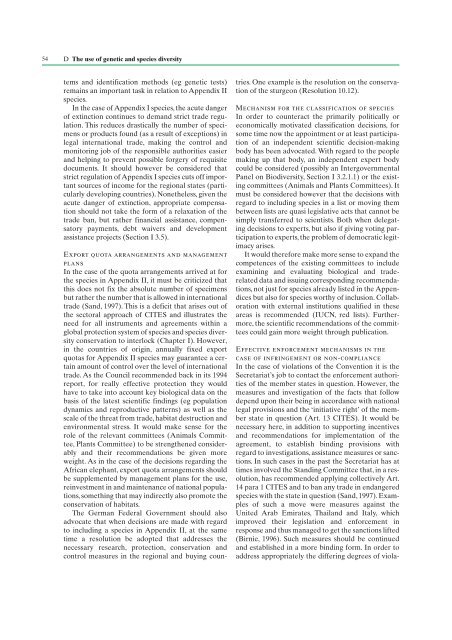Conservation and Sustainable Use of the Biosphere - WBGU
Conservation and Sustainable Use of the Biosphere - WBGU
Conservation and Sustainable Use of the Biosphere - WBGU
You also want an ePaper? Increase the reach of your titles
YUMPU automatically turns print PDFs into web optimized ePapers that Google loves.
54 D The use <strong>of</strong> genetic <strong>and</strong> species diversity<br />
tems <strong>and</strong> identification methods (eg genetic tests)<br />
remains an important task in relation to Appendix II<br />
species.<br />
In <strong>the</strong> case <strong>of</strong> Appendix I species, <strong>the</strong> acute danger<br />
<strong>of</strong> extinction continues to dem<strong>and</strong> strict trade regulation.<br />
This reduces drastically <strong>the</strong> number <strong>of</strong> specimens<br />
or products found (as a result <strong>of</strong> exceptions) in<br />
legal international trade, making <strong>the</strong> control <strong>and</strong><br />
monitoring job <strong>of</strong> <strong>the</strong> responsible authorities easier<br />
<strong>and</strong> helping to prevent possible forgery <strong>of</strong> requisite<br />
documents. It should however be considered that<br />
strict regulation <strong>of</strong> Appendix I species cuts <strong>of</strong>f important<br />
sources <strong>of</strong> income for <strong>the</strong> regional states (particularly<br />
developing countries). None<strong>the</strong>less, given <strong>the</strong><br />
acute danger <strong>of</strong> extinction, appropriate compensation<br />
should not take <strong>the</strong> form <strong>of</strong> a relaxation <strong>of</strong> <strong>the</strong><br />
trade ban, but ra<strong>the</strong>r financial assistance, compensatory<br />
payments, debt waivers <strong>and</strong> development<br />
assistance projects (Section I 3.5).<br />
Export quota arrangements <strong>and</strong> management<br />
plans<br />
In <strong>the</strong> case <strong>of</strong> <strong>the</strong> quota arrangements arrived at for<br />
<strong>the</strong> species in Appendix II, it must be criticized that<br />
this does not fix <strong>the</strong> absolute number <strong>of</strong> specimens<br />
but ra<strong>the</strong>r <strong>the</strong> number that is allowed in international<br />
trade (S<strong>and</strong>, 1997). This is a deficit that arises out <strong>of</strong><br />
<strong>the</strong> sectoral approach <strong>of</strong> CITES <strong>and</strong> illustrates <strong>the</strong><br />
need for all instruments <strong>and</strong> agreements within a<br />
global protection system <strong>of</strong> species <strong>and</strong> species diversity<br />
conservation to interlock (Chapter I). However,<br />
in <strong>the</strong> countries <strong>of</strong> origin, annually fixed export<br />
quotas for Appendix II species may guarantee a certain<br />
amount <strong>of</strong> control over <strong>the</strong> level <strong>of</strong> international<br />
trade. As <strong>the</strong> Council recommended back in its 1994<br />
report, for really effective protection <strong>the</strong>y would<br />
have to take into account key biological data on <strong>the</strong><br />
basis <strong>of</strong> <strong>the</strong> latest scientific findings (eg population<br />
dynamics <strong>and</strong> reproductive patterns) as well as <strong>the</strong><br />
scale <strong>of</strong> <strong>the</strong> threat from trade, habitat destruction <strong>and</strong><br />
environmental stress. It would make sense for <strong>the</strong><br />
role <strong>of</strong> <strong>the</strong> relevant committees (Animals Committee,<br />
Plants Committee) to be streng<strong>the</strong>ned considerably<br />
<strong>and</strong> <strong>the</strong>ir recommendations be given more<br />
weight. As in <strong>the</strong> case <strong>of</strong> <strong>the</strong> decisions regarding <strong>the</strong><br />
African elephant, export quota arrangements should<br />
be supplemented by management plans for <strong>the</strong> use,<br />
reinvestment in <strong>and</strong> maintenance <strong>of</strong> national populations,<br />
something that may indirectly also promote <strong>the</strong><br />
conservation <strong>of</strong> habitats.<br />
The German Federal Government should also<br />
advocate that when decisions are made with regard<br />
to including a species in Appendix II, at <strong>the</strong> same<br />
time a resolution be adopted that addresses <strong>the</strong><br />
necessary research, protection, conservation <strong>and</strong><br />
control measures in <strong>the</strong> regional <strong>and</strong> buying countries.<br />
One example is <strong>the</strong> resolution on <strong>the</strong> conservation<br />
<strong>of</strong> <strong>the</strong> sturgeon (Resolution 10.12).<br />
Mechanism for <strong>the</strong> classification <strong>of</strong> species<br />
In order to counteract <strong>the</strong> primarily politically or<br />
economically motivated classification decisions, for<br />
some time now <strong>the</strong> appointment or at least participation<br />
<strong>of</strong> an independent scientific decision-making<br />
body has been advocated. With regard to <strong>the</strong> people<br />
making up that body, an independent expert body<br />
could be considered (possibly an Intergovernmental<br />
Panel on Biodiversity, Section I 3.2.1.1) or <strong>the</strong> existing<br />
committees (Animals <strong>and</strong> Plants Committees). It<br />
must be considered however that <strong>the</strong> decisions with<br />
regard to including species in a list or moving <strong>the</strong>m<br />
between lists are quasi legislative acts that cannot be<br />
simply transferred to scientists. Both when delegating<br />
decisions to experts, but also if giving voting participation<br />
to experts, <strong>the</strong> problem <strong>of</strong> democratic legitimacy<br />
arises.<br />
It would <strong>the</strong>refore make more sense to exp<strong>and</strong> <strong>the</strong><br />
competences <strong>of</strong> <strong>the</strong> existing committees to include<br />
examining <strong>and</strong> evaluating biological <strong>and</strong> traderelated<br />
data <strong>and</strong> issuing corresponding recommendations,<br />
not just for species already listed in <strong>the</strong> Appendices<br />
but also for species worthy <strong>of</strong> inclusion. Collaboration<br />
with external institutions qualified in <strong>the</strong>se<br />
areas is recommended (IUCN, red lists). Fur<strong>the</strong>rmore,<br />
<strong>the</strong> scientific recommendations <strong>of</strong> <strong>the</strong> committees<br />
could gain more weight through publication.<br />
Effective enforcement mechanisms in <strong>the</strong><br />
case <strong>of</strong> infringement or non-compliance<br />
In <strong>the</strong> case <strong>of</strong> violations <strong>of</strong> <strong>the</strong> Convention it is <strong>the</strong><br />
Secretariat’s job to contact <strong>the</strong> enforcement authorities<br />
<strong>of</strong> <strong>the</strong> member states in question. However, <strong>the</strong><br />
measures <strong>and</strong> investigation <strong>of</strong> <strong>the</strong> facts that follow<br />
depend upon <strong>the</strong>ir being in accordance with national<br />
legal provisions <strong>and</strong> <strong>the</strong> ‘initiative right’ <strong>of</strong> <strong>the</strong> member<br />
state in question (Art. 13 CITES). It would be<br />
necessary here, in addition to supporting incentives<br />
<strong>and</strong> recommendations for implementation <strong>of</strong> <strong>the</strong><br />
agreement, to establish binding provisions with<br />
regard to investigations, assistance measures or sanctions.<br />
In such cases in <strong>the</strong> past <strong>the</strong> Secretariat has at<br />
times involved <strong>the</strong> St<strong>and</strong>ing Committee that, in a resolution,<br />
has recommended applying collectively Art.<br />
14 para 1 CITES <strong>and</strong> to ban any trade in endangered<br />
species with <strong>the</strong> state in question (S<strong>and</strong>, 1997). Examples<br />
<strong>of</strong> such a move were measures against <strong>the</strong><br />
United Arab Emirates, Thail<strong>and</strong> <strong>and</strong> Italy, which<br />
improved <strong>the</strong>ir legislation <strong>and</strong> enforcement in<br />
response <strong>and</strong> thus managed to get <strong>the</strong> sanctions lifted<br />
(Birnie, 1996). Such measures should be continued<br />
<strong>and</strong> established in a more binding form. In order to<br />
address appropriately <strong>the</strong> differing degrees <strong>of</strong> viola-

















